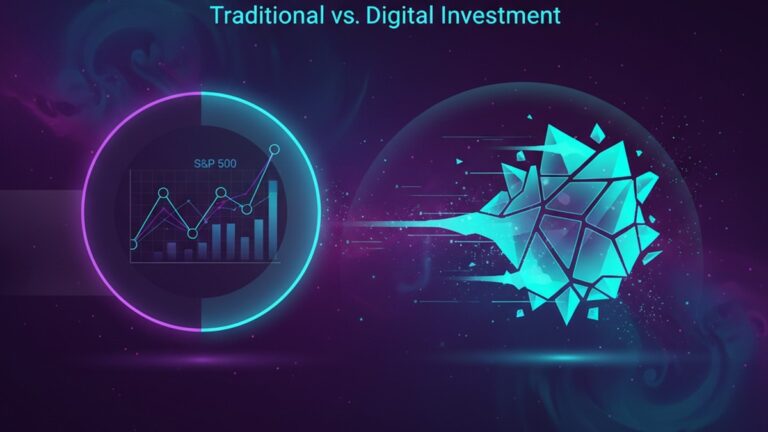In the ever-changing landscape of finance, the clash between traditional investment vehicles and modern digital assets has become a key focus for investors worldwide. As of today, October 6, 2025, the debate rages on with a striking revelation: while the Standard and Poor’s 500 (S&P 500) is enjoying record highs, it’s reportedly down 88% when compared to Bitcoin. This raises the question—are we comparing apples to oranges?
A Tale of Two Investments
Warren Buffett, the legendary investor and CEO of Berkshire Hathaway, has long been a vocal advocate of the S&P 500. He often touts it as a reliable benchmark for the U.S. stock market and a solid choice for long-term investors. Yet, despite the index’s celebrated performance, data indicates that it has significantly underperformed against Bitcoin over the past decade.
The S&P 500, which tracks the performance of 500 large companies listed on stock exchanges in the United States, has been a cornerstone of investment portfolios. As of this year, the index has reached unprecedented levels, fueled by economic recovery and technological advancements. Investors have reaped the benefits of a robust stock market, with companies like Apple, Microsoft, and Amazon driving growth.
Conversely, Bitcoin, the pioneering cryptocurrency, has had a spectacular rise since its inception. Born out of the 2008 financial crisis, Bitcoin offers a decentralized alternative to traditional financial systems. Its meteoric ascent has captivated investors and skeptics alike, with its value surging from mere cents to tens of thousands of dollars per coin.
Comparing Apples to Oranges?
The stark contrast in performance between the S&P 500 and Bitcoin has reignited discussions about the viability of traditional investments versus digital assets. Critics argue that comparing the two is inherently flawed due to their different natures. The S&P 500 is a diversified index representing the broader economy, while Bitcoin is a singular, highly volatile digital asset.
However, advocates of Bitcoin emphasize its role as a hedge against inflation and a store of value in an increasingly digital world. With central banks around the globe grappling with inflationary pressures, Bitcoin’s fixed supply of 21 million coins presents an attractive alternative. Proponents argue that its decentralized nature offers security and independence from government interference.
Warren Buffett’s Perspective
Warren Buffett’s stance on Bitcoin has been notably skeptical. He has previously referred to Bitcoin as “rat poison squared,” cautioning investors about its speculative nature. Buffett’s investment philosophy revolves around intrinsic value and long-term growth, principles that he believes are embodied by the S&P 500.
Yet, even with Buffett’s reservations, the allure of Bitcoin cannot be dismissed. Institutional investors and corporations like Tesla, Square, and MicroStrategy have invested billions in Bitcoin, citing its potential to diversify portfolios and enhance returns. This institutional endorsement has lent Bitcoin a veneer of legitimacy, drawing attention from mainstream investors.
The Broader Implications
The juxtaposition of the S&P 500 and Bitcoin highlights broader trends in the financial world. The rise of digital assets signals a shift in investor sentiment, driven by technological innovation and changing economic paradigms. As traditional markets evolve, so too must investors adapt to new opportunities and risks.
While the S&P 500 remains a staple of conventional investment strategies, Bitcoin’s ascent suggests a growing appetite for alternative assets. The cryptocurrency market, once viewed as a niche space for tech enthusiasts, has matured into a trillion-dollar industry with far-reaching implications.
Navigating the Future
As the financial world continues to evolve, investors are faced with the challenge of navigating a complex landscape. The decision to invest in the S&P 500, Bitcoin, or a combination of both depends on individual risk tolerance, investment goals, and time horizons.
For those who value stability and predictability, the S&P 500 offers a tried-and-tested approach to wealth accumulation. Its diversified nature mitigates risk and provides exposure to a broad spectrum of industries.
Conversely, investors with a higher risk appetite may find Bitcoin’s volatility and potential for outsized returns appealing. As the cryptocurrency market continues to grow, it presents opportunities for innovation and disruption in traditional finance.
Conclusion
The comparison between the S&P 500 and Bitcoin underscores the evolving dynamics of the investment landscape. While Warren Buffett remains a staunch advocate of the S&P 500, the undeniable rise of Bitcoin challenges conventional wisdom and invites investors to reconsider their strategies.
In the end, the choice between these two investment paths is a personal one, shaped by individual beliefs and financial objectives. As we look to the future, one thing is certain—the dialogue between traditional and digital assets will continue to shape the world of finance for years to come.

Steve Gregory is a lawyer in the United States who specializes in licensing for cryptocurrency companies and products. Steve began his career as an attorney in 2015 but made the switch to working in cryptocurrency full time shortly after joining the original team at Gemini Trust Company, an early cryptocurrency exchange based in New York City. Steve then joined CEX.io and was able to launch their regulated US-based cryptocurrency. Steve then went on to become the CEO at currency.com when he ran for four years and was able to lead currency.com to being fully acquired in 2025.


